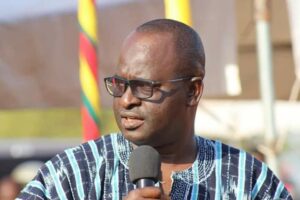Minister appeals for improved water systems for Upper West Region

Dr. Hafiz Bin Salih, the Upper West Regional Minister, has appealed to the Community Water and Sanitation Agency (CWSA) to help improve the water systems in the region to alleviate the plight of the people in accessing potable water.
He said water was a basic necessity but that “there are many communities in the Upper West Region that lacked the supply of potable water, so if we are able to get these systems in place, it will go a long way in addressing the challenges that we face.”
Dr. Salih made the appeal when a team from the CWSA and the Water Resources Commission led by the Chief Executive Officer (CEO) of the CWSA, Dr. Worlanyo K. Siabi and the Ag. Executive Secretary of the Water Resources Commission called on him on Friday.
The team was in the region to engage the people and stakeholders on the improvement of the water systems, especially in the Sissala East Municipality, as well as to mark the World Fish Migration Day (WFMD) on Saturday.
The Minister explained that the development of the region was dear to his heart and that improved access to potable water was paramount to his development trajectory.
Dr. Salih, therefore, reminded the CWSA CEO of a long-standing request for the agency to expand the water systems in the region when the agency got approval to do so.
The Minister commended Dr. Siabi for his commitment to supporting the region in terms of water supply over the years, and expressed hope that the support would continue.
On his part, Dr. Siabi noted that the agency was working to improve the water systems in the region and identified the re-designing and re-construction of the water system in Tumu in the Sissala East Municipality as one of the moves.
“We are experts in underground water and Upper West is one of the places where groundwater is quite a lot hence our decision to target groundwater supply,” he explained.
He said, they would be doing the reconstruction of the water system alongside the operation of the existing systems so as not to disrupt the water situation.
“Now there is a technology about solar, which is more advanced than what we used to do.
“So, we will use hybrid pumps, which can switch between solar and electricity so that if there are lights off, we will still provide water,” Dr. Worlanyo explained.
Source: GNA
